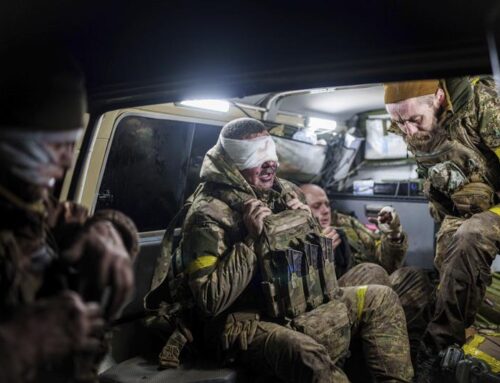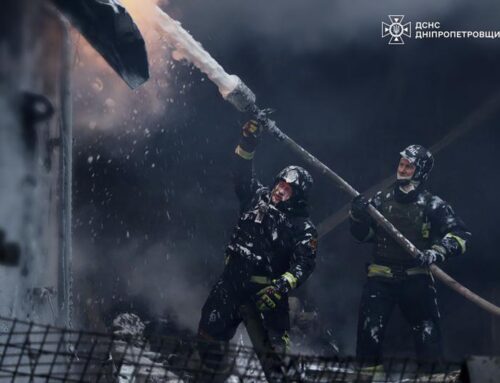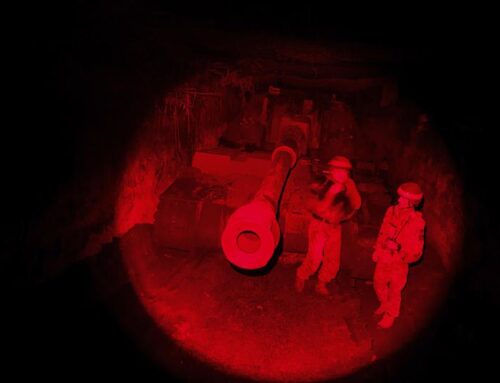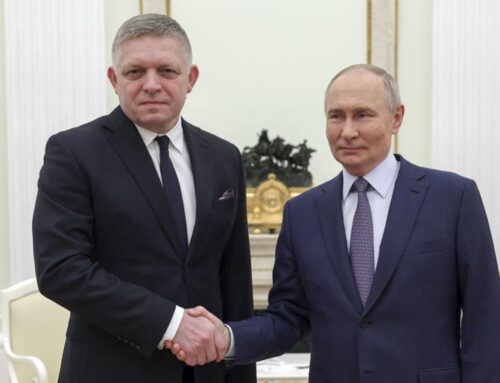KYIV, Ukraine (AP) — The armed rebellion against the Russian military may have been over in less than 24 hours, but the disarray within the enemy’s ranks was an unexpected gift and timely morale booster for Ukrainian troops.
The spectacle of Yevgeny Prigozhin’s mutiny in the critical military command and control hub in the Russian city of Rostov-on-Don, and later Russia’s scramble to fortify Moscow as troops marched to upend the country’s military leadership was greeted “with applause” by commanders of Ukraine’s Eastern Group of Forces, said its spokesperson, Serhii Cherevatiy.
“Soldiers at the front lines are positive about it,” he said. “Any chaos and disorder on the enemy’s side benefits us.”
A video of well-known Ukrainian drone commander “Magyar” watching the revolt while eating enormous amounts of popcorn went viral. A plethora of gleeful memes mocking Russian leader Vladimir Putin inundated social media, and statement after statement from Ukraine’s top brass described the turmoil as a sure sign of more instability to come.
The immediate crisis ended with a deal mediated by Minsk that would send Prigozhin into exile in Belarus. But for Ukrainians watching, the damage was done: Russian vulnerabilities were exposed, and by agreeing to concessions hours after branding Prigozhin a back-stabbing traitor, Putin appeared weak and desperate.
The short-lived rebellion did not noticeably affect Russian army posture along the 1,000 kilometer (600-mile) front line in eastern Ukraine, but it could give Ukraine the impetus it needs to intensify the beginning phase of its counteroffensive, which military leaders have admitted is going slower than expected.
“In the short term, it distracted attention from the war and diverted some resources from the front,” said Nigel Gould-Davies, a senior fellow for Russia and Eurasia at the International Institute for Strategic Affairs. But in the longer term, he said, it shows lack of unity among Russia’s fighting forces. “It’s terrible for Russia’s morale. The officers and soldiers alike. It’s very good for Ukraine’s morale.”
On Russian Telegram channels, military servicemen who blog about the war urged Russian soldiers to stay focused on the war. “Brothers! Everyone who holds a weapon at the line of contact, remember, your enemy is across from you,” read one message.
Ukrainian soldier Andrii Kvasnytsia, 50, who was injured fighting in the eastern city of Bakhmut, where battles are nonstop along the southern flanks of the salt-mining town occupied by Russian troops, said “Everyone is excited.”
“My friend called me today and he said: ’Andrii, I haven’t been drinking for so many years, but today I have a good reason to drink,” he said. “It is all hard, not easy, but we will certainly win.” He spoke to The Associated Press in Kyiv, where he is recuperating.
As Wagner troops marched toward Moscow, Hanna Malyar, Ukraine’s deputy defense minister, announced progress in several directions along the front line where fighting has been raging for weeks, and that Russian advances further north were thwarted.
“The enemy’s weakness is always a window of opportunity, it allows us to take the advantage,” she told AP, adding that it was too early to assess how the political game playing out in Russia might give Ukraine the military upper hand.
Ukraine stepped up attacks in several directions in the southeast earlier this month, a move that signaled its much anticipated counteroffensive had begun. But progress has been “slower than desired,” Ukrainian President Volodymyr Zelenskyy has acknowledged.
Russian Defense Minister Sergei Shoigu said last week a new reserve army would be formed by the end of June, bolstering Russian manpower along the Ukrainian front, where Russia has committed 90% of its forces and significantly outnumbers Ukrainian fighters already.
Experts have said the Ukrainians need to maintain flexibility and speed to exploit Russian vulnerabilities along the front line, and puncture lines of defense when the opportunity presents itself.
With modern NATO-standard weapons systems in their possession, morale is the necessary ingredient to summon the velocity Ukrainian troops need to change the dynamics on the ground, they say.
“This is going to give the Ukrainians a real boost,” said James Nixey, head of Chatham House’s Russia and Eurasia program. “If we’ve been saying that the Ukrainians do have a lot to fight for, they have been lacking a little bit in morale of late.”
Ukrainian commanders told their fighters the discord playing out in Russia was, indirectly, their doing. “The heroes of Bakhmut who held the city for 10 months and exhausted the enemy, they are the co-authors of this Russian epic fail,” said Cherevatiy.
The truth is more complicated. The longstanding rivalry between Prigozhin and the Russian military leadership predates the full-scale invasion, but Wagner’s relative effectiveness compared with regular army troops fighting in the city raised Prigozhin’s profile and may have given him the confidence to forge ahead with the rebellion.
Still, the message resonates among Ukrainian military ranks as it prepares for the next decisive push in the war.
In Ukraine’s southeastern Zaporizhzhia region on Sunday, servicemen belonging to a mortar unit fired at Russian targets from their positions, dedicating each blast to grievances caused by Russia.
“For Kakhovka Dam!” cried a Ukrainian Special Forces servicemen with the call sign Rhein, referring to the catastrophic dam collapse blamed on Russia earlier this month that submerged entire Ukrainian communities.
___
Associated Press journalists Mystyslav Chernov in Zaporizhzhia, Ukraine, and Danica Kirka in London contributed to this report.
___
Follow AP’s coverage of the war in Ukraine: https://apnews.com/hub/russia-ukraine
This article first appeared on APnews.com







Leave A Comment